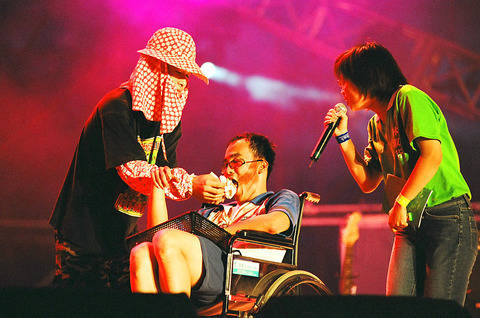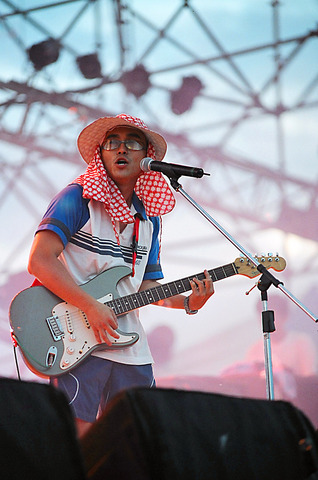Known for his outrageous on-stage antics, his brazen and often inflammatory remarks and his blatant and unabashed belief in Taiwan's independence, Ko Ren-jian (
In the 15 years he's been the mouthpiece for working class politico-punk combo, LTK (
He's set off fire extinguishers and aimed them into the audience, he's hit band members over the head with beer bottles, he's set alight the band's instruments while on stage and, as if all that isn't enough he's instigated the odd riot or two.

PHOTOS: TCM
Should you run into the eloquent and mild-mannered Ko on the street, however, you'd probably be hard-pressed to believe he was capable of such anti-social behavior. But as anyone who has caught LTK in the act will attest, he is capable of just about anything when on stage with his band. And he does it all not in the name of rock'n'roll, but simply because it is what people have come to expect from him and his nefarious band.
"People don't come to see us to listen to the music, they come to see what we're going to say or do. And of course, they come to take part in what are best described as mini-riots," said Ko. "Our stage shows are more important than the music. People want to have a good time, they want to go mad, have a laugh and abuse us, be it verbally or by throwing things at us. It's become part of the band's image."
It might sound odd that people actually pay money to see a band not for its music but for its mayhem, but then Ko and LTK have never really been known for their musical smarts. Nor have they made any bones about their lack of musical ability.

While many an aspiring young band might consider the inability to play its instruments a rather debilitating obstacle to being able to generate a loyal following, Ko and his non-musical buddies have exploited their musical inabilities to the max. He realized very early on that you don't necessarily need to know how to play in order to attract an audience.
"At university I realized that if you stood up in public and swore and made fun of the nation's political and social systems people would stop and listen. It was easy, it didn't matter that we sounded awful," he said. "Sure, some people found it offensive, but then other students didn't and thought what we were doing was pretty cool. What we do today grew from doing these things on campus."
Along with brazenly ridiculing government and society, Ko began to incorporate short comedic skits into the band's sets. By the time the band released its debut album, The Anus of Happy Desires (
Even when the group ditched its unharmonious guitar-driven sound and began experimenting with offbeat electronica for its second album Revenge of the Taike (
"I don't think it really mattered what we did with the music by then, as we'd already built up a reputation as must-see band. We simply gave people what they wanted -- total chaos," said Ko.
It was at this time that Ko decided the short skits that had become such an integral part of the band's gigs were not quite shocking enough. He decided to make them even more provocative by adding aspects of sadomasochism. One such outrageous and crowd-pleasing parody saw him ridiculing the police force with the help of a sausage, a motorcycle helmet, a bottle of Taiwan Beer and his own genitalia.
"It was a way to express ourselves. I knew we'd shock people, but what better way is there to get people's attention, especially if you're not particularly talented musically, which we really weren't," he said. "The skits all had a meaning and were designed to help both us and the audience vent their frustrations in regards just what was wrong the country, the system and society."
Ko's often over-the-top stage shows were -- and for that matter still are -- designed to be offensive yet harmless fun. But, while audience participation often results in little but the band being pelted by various projectiles an incident five years ago nearly put an end the band's outrageous stunts.
Having been invited to participate in a concert in front of the Presidential Building in 2000, Ko's antics riled the audience into such a frenzy that when water bottles and other ad-hoc missiles did begin to fly a young female student was badly injured in the ensuring melee. In the weeks following the unfortunate incident Ko and his band found themselves in the spotlight for all the wrong reasons.
"It was an accident -- nothing else. I'm sorry the girl got hurt and I'm sorry it got out of hand, but these things happen at our concerts," he said. "She wasn't an innocent bystander -- she'd come to see us. The media didn't look at it like that. They went all out to demonize us and what we do, which was totally wrong."
Bottle throwing incidents and bad press, aside, the band has managed to survive and indeed thrive. Its gigs, be they in a muddy field in Kenting or the confines of a smoke-filled bar still attract large crowds and earlier this month Ko and LTK released their first new album in four years. And its contents could be set to surprise everyone from the most diehard fan to those who have only read about the band.
After kicking up a tuneless racket for 15 years, the band that was once proud of its musical inability has come out of its four year hiatus and released its most musically challenging piece of vinyl to date. Entitled Ten Yai Chi Tou Lang (
"We've got three new members in the band and they are young compared to me, and their fresh input has enabled us to take a very different approach this time around," he said. "To break with tradition I wanted to put lots of distinctive styles into the album and I think we managed to pull this off."
Ko's decision to mix it up with genres ranging from contemporary Taiwanese folk to mild jazz and lay off the profanity has worked. Instead of going for the throat Ko lambastes with a more tongue-in-cheek style of humor than before. And, more importantly, the crux of the album is the music itself rather than lyrics. It's a far cry from the LTK of old, but as Ko readily admits, "it was time for a change."
"People have said that we're still the same, but I tell them we're not. Sure, the gigs are still rowdy, but our music has mellowed," said Ko. "And there's no denying the fact that the album is musically superior to anything we've released in the past."

As Taiwan’s second most populous city, Taichung looms large in the electoral map. Taiwanese political commentators describe it — along with neighboring Changhua County — as Taiwan’s “swing states” (搖擺州), which is a curious direct borrowing from American election terminology. In the early post-Martial Law era, Taichung was referred to as a “desert of democracy” because while the Democratic Progressive Party (DPP) was winning elections in the north and south, Taichung remained staunchly loyal to the Chinese Nationalist Party (KMT). That changed over time, but in both Changhua and Taichung, the DPP still suffers from a “one-term curse,” with the

Jan. 26 to Feb. 1 Nearly 90 years after it was last recorded, the Basay language was taught in a classroom for the first time in September last year. Over the following three months, students learned its sounds along with the customs and folktales of the Ketagalan people, who once spoke it across northern Taiwan. Although each Ketagalan settlement had its own language, Basay functioned as a common trade language. By the late 19th century, it had largely fallen out of daily use as speakers shifted to Hoklo (commonly known as Taiwanese), surviving only in fragments remembered by the elderly. In

William Liu (劉家君) moved to Kaohsiung from Nantou to live with his boyfriend Reg Hong (洪嘉佑). “In Nantou, people do not support gay rights at all and never even talk about it. Living here made me optimistic and made me realize how much I can express myself,” Liu tells the Taipei Times. Hong and his friend Cony Hsieh (謝昀希) are both active in several LGBT groups and organizations in Kaohsiung. They were among the people behind the city’s 16th Pride event in November last year, which gathered over 35,000 people. Along with others, they clearly see Kaohsiung as the nexus of LGBT rights.

In the American west, “it is said, water flows upwards towards money,” wrote Marc Reisner in one of the most compelling books on public policy ever written, Cadillac Desert. As Americans failed to overcome the West’s water scarcity with hard work and private capital, the Federal government came to the rescue. As Reisner describes: “the American West quietly became the first and most durable example of the modern welfare state.” In Taiwan, the money toward which water flows upwards is the high tech industry, particularly the chip powerhouse Taiwan Semiconductor Manufacturing Co (TSMC, 台積電). Typically articles on TSMC’s water demand